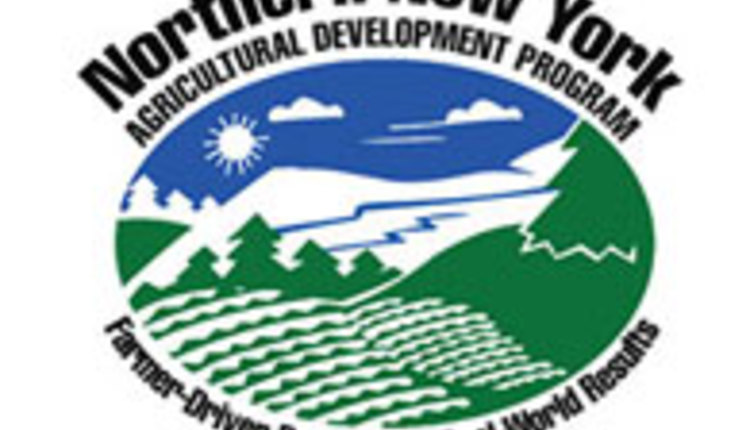
Shields' biocontrol nematodes protocol for managing alfalfa snout beetle (ASB), highlighted in the paper, also shows great promise for managing corn rootworm.
The research foundation for the use of biocontrol nematodes to save alfalfa crops in New York State, and now being used or evaluated in multiple other crops and in other states, was established with the support of the Northern New York Agricultural Development Program (NNYADP). The "What is the True Cost of Alfalfa Snout Beetle on Your Farm" paper and "Persistent Biocontrol Nematodes: What, Why, How, When, and Where to Get Them" fact sheet are posted on the NNYADP website at www.nnyagdev.org.
Shields began the quest to find a solution to alfalfa snout beetle in 1989 on the Peck Homestead Farm in Great Bend, New York, where ASB damage to alfalfa crops was significantly decreasing milk production.
Due to the importance of alfalfa as a forage crop in the dairy, beef cattle, equine and other livestock sectors, the farmer-driven NNYADP made a firm commitment to fund the research needed to find a solution. Today, the inexpensive biocontrol solution developed by that research benefits dairy farmers and alfalfa, corn, and berry growers in northern New York, organic farmers throughout the Northeast, and corn growers across the U.S. and in Ontario, Canada.
"To date we have applied biocontrol nematodes to nearly 28,000 acres in northern New York on more than 140 farms. In those fields, the alfalfa stand life has increased back to 4 to 6 years compared to the previous ASB-ravaged 1-2 years. Neighboring farms should work together to control ASB on both farms," says Shields, who will speak virtually about the biocontrol nematodes with corn growers in the American Southwest in late January, and recently shared the research results with the Ontario Ag Conference.
Shields breaks the $300 to $600 per cow per year cost of ASB into two areas: the cost of forage loss from the field with the cost of replanting, and the cost of purchasing off-farm protein to replace the alfalfa protein lost with the ASB-damaged crop.
Analysts with the W.H. Miner Agricultural Research Institute, Chazy, New York, and Oak Point Agronomics, Hammond, New York, have estimated the cost of losing and reestablishing an alfalfa stand at $200 to $500 per acre. The cost of additional purchases of soy protein once ASB becomes established and damages a farm's alfalfa crop ranges from $4.70 to $16.80 per cow per month.
How do you know if you have ASB? Shields says that alfalfa stand loss that is often blamed on winterkill may actually be a result of ASB. He notes, "Alfalfa snout beetle often kill out the alfalfa on the high spots in the field first, a symptom which should draw attention from the truck as you are driving past." The best time to survey a field or farm for ASB is in October when yellowing alfalfa plants can be dug up to examine for ASB larvae.
What can you do if you have ASB? Alfalfa snout beetle can be controlled for many years with a single application of native New York biocontrol nematodes on each field, using a protocol developed by Shields and Cornell University Research Support Specialist Antonio Testa while working with more than 120 dairy farmers in northern New York. The cost to apply the biocontrol nematodes is a one-time expense in the range of $40 to $60 per acre. More recent research has shown the biocontrol nematodes can be applied as part of a liquid manure application.
Do the biocontrol nematodes also control corn rootworm? "We first began to see indications that the biocontrol nematodes were having an impact on corn rootworm on one of the northern New York farms rotating its alfalfa crop with corn. Recent trials with the biocontrol nematodes in New York and now in other U.S. states are showing their effectiveness at reducing corn rootworm populations including rootworm populations becoming resistant to Bt-RW-traited corn,"Shields says.
Are the biocontrol nematodes effective against other crops? Shields and Testa have successfully applied the biocontrol nematodes to control pests in berry crops and have trials underway to examine their effectiveness in managing wireworms and Colorado potato beetle.
Who can you call for help? For more information on the use of biocontrol nematodes, farmers should contact their local Extension office. In northern New York, contacts include Cornell Cooperative Extension field crops specialists Michael Hunter: 315-788-8450, and Kitty O'Neil, Ph.D.: 315-379-9192, and Cornell PRO-DAIRY Dairy Forage Systems Specialist Joe Lawrence: 315-788-4815. Mary DeBeer, 518-812-8565, is a northern New York-based provided of the biocontrol nematodes.
To see a history of the NNYADP alfalfa snout beetle research projects, visit the Research: Field Research: Alfalfa Snout Beetle pages on the website at www.nnyagdev.org. Funding for the Northern New York Agricultural Development Program is supported by the New York State Legislature and administered by the New York State Department of Agriculture and Markets.

